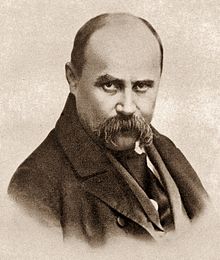Kobsar (collection of poems)
Kobsar ( Ukrainian Кобзар ) is a collection of poems by the Ukrainian poet and painter Taras Shevchenko .


It consists of eight poems, mostly romantic, written in the Ukrainian language, and is the first and most famous cycle of poems by the Ukrainian national poet .
Initial release
The collection of poems was Petr Ivanovich Martos first time in 1840 ( Russian Петр Иванович Мартос ; 1811-about 1880) in Russian Saint Petersburg published after Martos, a landowner from Poltava, in winter 1839/1840 on the recommendation of Karl Bryullov of Shevchenko in Saint Petersburg had painted, discovered the manuscript of the collection of poems and had it printed at his own expense.
The eight poems in the first edition were:
- Думи мої, думи мої, лихо мені з вами Dumy moii, dumy moii, lycho meni s wamy
- Перебендя Perebendja
- Катерина Kateryna
- Тополя Topolja
- Думка / Dumka
- Нащо мені чорні брови Naschtscho meni tschorni browy
- До Основ'яненка Do Osnov'janenka
- Іван Підкова Ivan Pidkova
- Тарасова ніч Tarasowa nitsch
meaning
The appearance of "Kobsar" was a milestone for the Ukrainian culture and language. The "Aeneida" by Ivan Kotljarewskyj , published in the early 19th century, was considered to be the actual beginning of Ukrainian literature , the "Kobsar" and the subsequent works by Shevchenko rounded off the process.
"Kobsar" is the most widely read and best known work of Shevchenko to this day, with which he established the modern Ukrainian literary language. Due to the book title, Shevchenko himself was nicknamed "Kobsar" after its publication and his other poems were also generally referred to as "Kobsar" and, similar to the Cossack Mamaj , were symbolic of the Ukrainian national and literary renewal. The title of the work goes back to the designation of Ukrainian minstrels who were called kobsar and played mainly the lute instrument kobsa .
Dubbing
The Ukrainian composer, pianist and conductor Mykola Lyssenko (1842–1912) created the music for "Kobsar" in more than 80 works of different genres, of different dimensions and in varying forms.
German translations
Already in the 19th century the "Kobsar" was translated into German by Johann Georg Obrist , V. Umlauff von Frankwell, P. Skobels'kyj, K. Klymkovic, Iwan Franko , J. Virginia (Scheuermann Fould Laengsdorf) . On the occasion of Taras Shevchenko's 125th birthday, the Kiev publishing house for national minorities decided in 1939 to publish Shevchenko's work in German and the collective of German anti-fascist writers formed by the German politician, writer and translator Alfred Kurella , consisting of the poets and translators Alfred Kurella and Erich Weinert , Hugo Huppert , Hedda Zinner , Hans Rodenberg , Klara Blum , Erwin Johannes Bach , Franz Leschnitzer and Maximilian Schick , who had emigrated from Germany to the Soviet Union, created a new version of almost the entire “Kobsar” in German, which was included in 1951 a foreword by Alexander Deutsch was published in two volumes in Moscow by Verlag für Deutschsprachige Literatur.
Web links
- On Shevchenko and his work (English / Ukrainian / Russian)
- Literature by and about Kobsar in the catalog of the German National Library
- Sanylo Husar Struk: Kobzar. In: Internet Encyclopedia of Ukraine
- Taras Shevchenko - Selected Works (PDF; Ukrainian and German)
Individual evidence
- ↑ a b Article on the book in the online encyclopedia of Ukraine (English) accessed on May 10, 2016
- ^ Alfred Anton Jensen : Taras Shevchenko. A Ukrainian poet's life , Adolf Holzhausen, Vienna 1916, p. 58. Full text at Wikisource .
- ^ Memories of Taras Shevchenko. (Russian) Retrieved August 21, 2018
- ↑ Biography of Taras Shevchenko on the website of the Shevchenko Museum in Toronto, Canada (English) accessed on August 27, 2018
- ^ Taras Shevchenko: Ukrainian national poet. In: Ukraine News ; accessed on May 10, 2016
- ^ Reinterpretation of the "national sanctuary". (PDF) In: Ukraine-Analyzes, No. 81, October 26, 2010, p. 2; accessed on May 10, 2016
- ^ Rolf Michaelis : Under the poplars of Kiev . In: Die Zeit , No. 45/1991
- ^ The Leipzig Conservatory in the letters from MW Lyssenko. (PDF) p. 1; accessed on May 10, 2016
- ↑ A. Pancenko - Α. Kurella as the organizer of the translation of “Kobsar” (PDF); Retrieved on May 10, 2016. In 1987, edited by Rolf Göbner, a selection was published in Kiev and Berlin.
